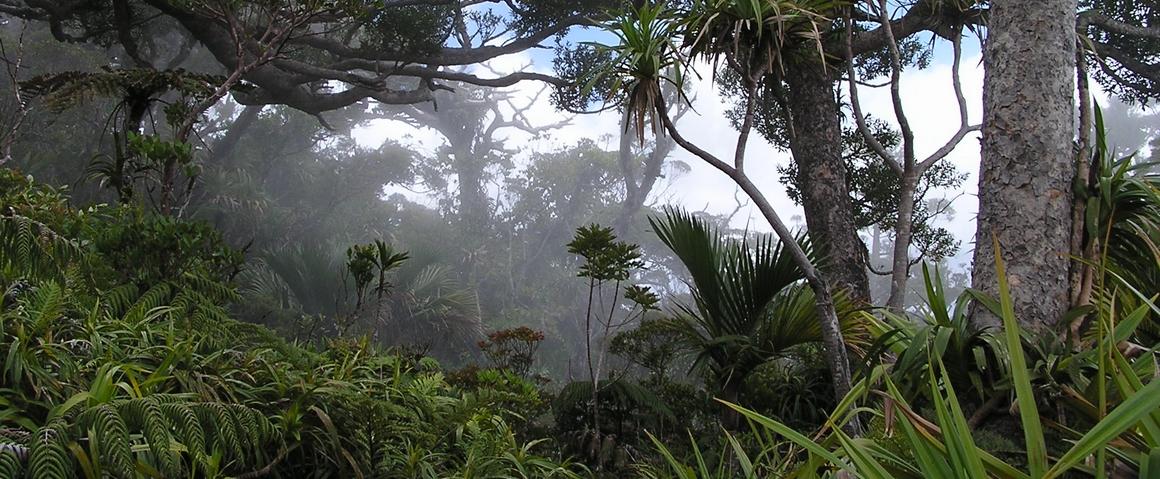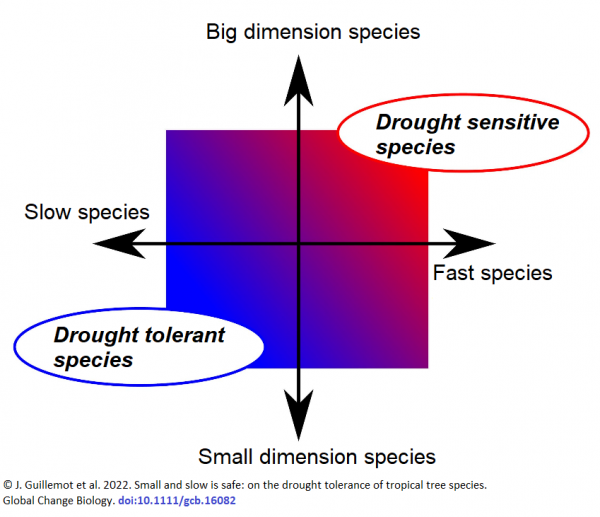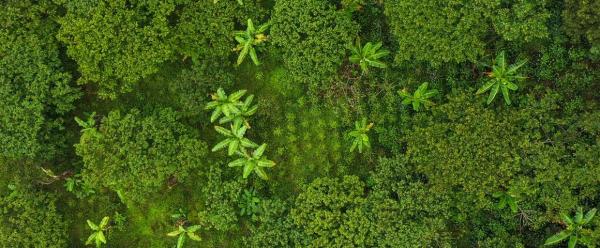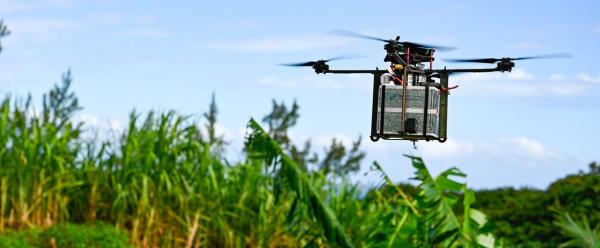Results & impact 10 October 2025
- Home
- Press area
- Press releases
- Drought tolerance of tropical forests
In the tropics, global warming is favouring smaller, denser, slow-growing trees

Mont Panié forest, New Caledonia © J. Tassin, CIRAD
In 2020, a study published in Science showed that tropical forest dynamics could be predicted by plotting the many component tree species along two axes. The first, built on life history traits relating to tree growth rate, differentiates between fast-growing trees with a short lifespan and slower-growing species with a long lifespan. The second separates large species that reproduce less from smaller species with much greater potential to reproduce.
According to the study, the growth rate and lifespan of the vast majority of tropical trees can be predicted using several easily measurable characteristics. However, what about how those species behave in the event of change, particularly climate change? This is what another research team chose to study, by looking at how the drought tolerance of species may be linked to the two aforementioned axes.
"We reviewed the scientific literature to extract the characteristics of 601 tropical species", says Joannès Guillemot, a forest ecophysiology researcher at CIRAD and lead author of the new study. "The aim was to rank them according to the axes defined by the Science study, to see whether there was any correlation with drought tolerance traits. We wanted to know whether drought tolerance is an independent aspect of tropical forest demographics or associated with the determining factors identified previously."
The researchers also looked at the genetic proximity of species, to see whether closely related species had a similar level of drought tolerance.
An overall trend in favour of small, slow-growing species
Drought tolerance proved to be correlated to the size and growth rate of the species studied, with smaller, slower-growing species being more tolerant.
According to Nicolas K. Martin-St Paul, a researcher at INRAE and second author of the study, "our results provide a conceptual framework for interpreting the saturation of tropical forest productivity as a result of climate change pressure. They will serve to imagine the composition and shape of tomorrow's tropical forests".
Genetic proximity cannot be used to predict drought tolerance
The second major result indicated that even if they were genetically very closely related, species sometimes had very different degrees of drought tolerance. "This is bad news for those working to restore or conserve forests, because it means we cannot use our current knowledge to predict the behaviour of unknown plants, even if they are related to others", Joannès Guillemot regrets.
Limited local consequences for the time being
However, the researchers have a warning about what conclusions can be drawn from their study: although their work demonstrated a general trend, the local applications are very limited for the time being. As Joannès Guillemot stresses: "Although we showed that drought tolerance is not independent of the other demographic axes, the correlation between that tolerance and other commonly measured traits such as wood density or leaf thickness is too tenuous to allow recommendations on a local level. It is therefore still crucial to measure drought tolerance, particularly to guarantee the success of forest restoration campaigns in response to climate change."
References
Joannès Guillemot, Nicolas K. Martin-St Paul, Leticia Bulascoschi, Lourens Poorter, Xavier Morin, Bruno X. Pinho, Guerric le Maire, Paulo Bittencourt, Rafael S. Oliveira, Frans Bongers, Rens Brouwer, Luciano Pereira, German Andrés Gonzalez Melo, Coline C. F. Boonman, Kerry A. Brown, Bruno E.L. Cerabolini, Ülo Niinemets, Yusuke Onoda, Julio V. Schneider, Serge Sheremetiev, Pedro H.S. Brancalion. 2022. Small and slow is safe: on the drought tolerance of tropical tree species. Global Change Biology
Nadja Rüger, Richard Condit, Daisy H. Dentsaara, Saara J. Dewalt, Stehen P. Hubbelljeremy, Jeremy W. Lichstein, Omar R. Lopez, Christian Wirth and Caroline E. Farrior. 2020. Demographic Trade-Offs Predict Tropical Forest Dynamics. Science
W. Hubau et al. 2020. Asynchronous carbon sink saturation in African and Amazonian tropical forests. Nature




























